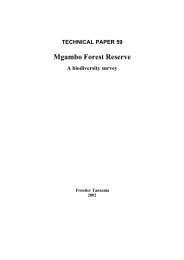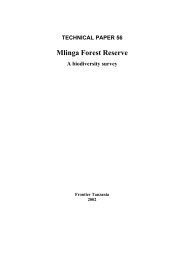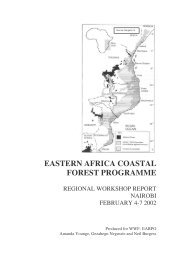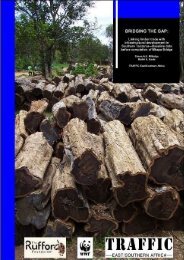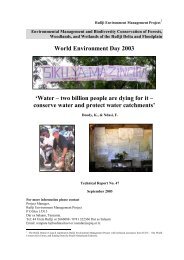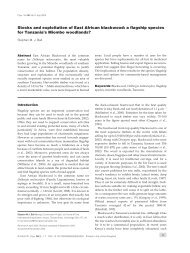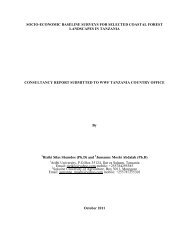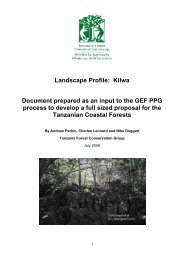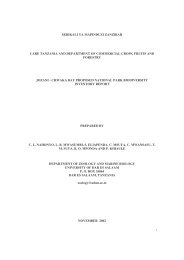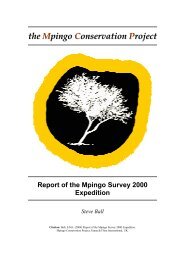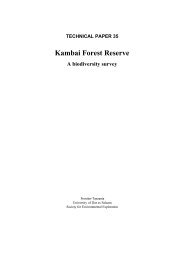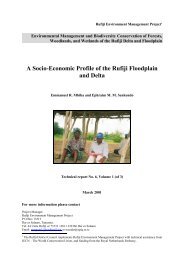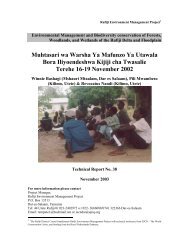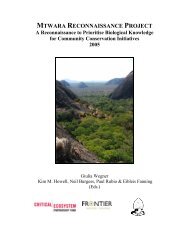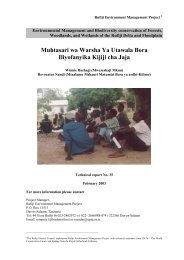serikali ya mapinduzi zanzibar care tanzania and department
serikali ya mapinduzi zanzibar care tanzania and department
serikali ya mapinduzi zanzibar care tanzania and department
Create successful ePaper yourself
Turn your PDF publications into a flip-book with our unique Google optimized e-Paper software.
4.4.5 Threats to biodiversity<br />
Some plants (Mvule, Ukindu, Mk<strong>and</strong>aa, <strong>and</strong> Mshubiri mwitu) <strong>and</strong> animals (Wildpigs,<br />
chesi <strong>and</strong> hyraxes) were reported as either completely disappeared or remained in<br />
small numbers. Reasons behind this were said to be over exploitation for plants <strong>and</strong><br />
illegal hunting for animals. Respondents declared that, before the present programme<br />
of complete protection started, people were free to enter the forest hence did a lot of<br />
destruction. Other reported reasons were such as weather change, sabotage while<br />
others did not know any of the causes although declared the disappearance of some<br />
plants <strong>and</strong> animals.<br />
Wild pigs were reported as completely disappeared animals in Ngezi forest. The<br />
respondents said that Wamakonde were the main poachers of these species, where<br />
they used them as a source of food. Other respondents (2%) further reported that, wild<br />
pigs were killed because of their destructive nature. Plants reported as completely<br />
disappeared were mainly used for fuel wood (54%) <strong>and</strong> timber production (20%).<br />
Some respondents felt disadvantaged as a result of total protection of Ngezi forest.<br />
They said they lost their freedom to use the forest produce, <strong>and</strong> even in passing in the<br />
forest. Others indicated their concerns on the loss of access to building poles <strong>and</strong><br />
firewood (Table 4.20). However, many respondents (33%) appeared happy with the<br />
present protection system.<br />
Table 4.20: The reported disadvantages experienced after the initiation of total<br />
protection programme at Ngezi forest<br />
Disadvantage Frequency Percentage (%)<br />
None 66 33<br />
Loss of freedom to use the forest for everyday needs 39 19<br />
Lack of wild meat 5 2<br />
Lost access to building materials <strong>and</strong> firewood 92 46<br />
Total 202 100<br />
Source: Field data, (January 2005)<br />
Following the high dem<strong>and</strong> of the forest products by the surrounding community, the<br />
study predicted that if measures are not taken, then Ngezi forest would be in serious<br />
danger in the near future. Studies by Khatibu <strong>and</strong> Suleiman, (1993); Smith <strong>and</strong> Scherr,<br />
(2002); Ngece, (2003) also indicated the high dem<strong>and</strong> of firewood <strong>and</strong> other forest<br />
products by the community around forests. The study by Khatibu <strong>and</strong> Suleiman,<br />
(1993) also suggested some alternative provisions to the community such as use of<br />
efficient stoves, establishment of a programme on integrated l<strong>and</strong>-use around the area,<br />
introduction of tree planting for different purposes etc. All these ideas appear useful,<br />
but the main problem for their implementation is the size of the l<strong>and</strong> available in<br />
relation with the population growth rate of the area. Many respondents complained<br />
that they had small l<strong>and</strong>, <strong>and</strong> the little they had was existed. What makes things worse<br />
is the promise made by the Ministry on providing the locals with alternative l<strong>and</strong> for<br />
their basic needs. Some respondents reported this <strong>and</strong> they indicated to be unhappy<br />
with the situation hence indicating some conflicts between the two groups.<br />
4.4.6 Future management of Ngezi Forest Reserve<br />
When it came to what respondents had as suggestions for harmonious conservation of<br />
the area, many (40%) said they wanted to have an access to small uses of forest<br />
72



